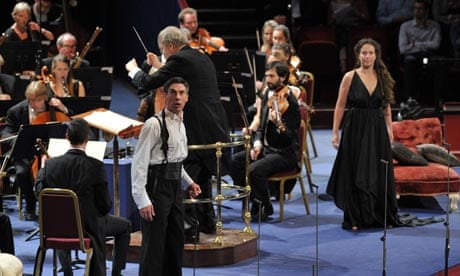Celebrating the 150th anniversary of Debussy's birth is naturally one of the themes of this year's Proms. The first of the tributes was also the most ambitious – a performance of his only completed opera, Pelléas et Mélisande, conducted by John Eliot Gardiner with the period instruments of his Orchestre Révolutionnaire et Romantique.
It was a typical Proms semi-staging; the singers made their entrances and exits, and an armchair and chaise-longue served as the set. Perhaps it contained remnants of the production that Gardiner conducted two years ago with some of the same cast at the Opéra Comique in Paris (where Pelléas was first performed), but it seemed rather detached and chilly: the protagonists were often far apart on the Albert Hall platform, with physical contact, even between Phillip Addis's nicely baritonal Pelléas and Karen Vourc'h's rather unfocused Mélisande, minimised.
Elodie Méchain was Geneviève and Dima Bawab Yniold, while the most compelling performances came from Laurent Naouri as a lost, helpless Golaud, and John Tomlinson as Arkel, whose enduring faith in humanity provides the work with its few glimpses of optimism.
If Gardiner's brisk clarity, favouring symbolist hues over impressionist gauzes, sometimes stripped the score of an element of its mystery, the delicacy of the ORR's playing, in the final act especially, was something to savour. When he last conducted this opera at the Proms in 1988, Gardiner made a point of performing the original version of the score, without the orchestral interludes that Debussy was persuaded to add to cover scene changes. Here he gave us the familiar revised version, in the process underlining how much more Wagnerian than the rest of the work those later written interludes are.
Available via BBC iPlayer until 22 July.

Comments (…)
Sign in or create your Guardian account to join the discussion